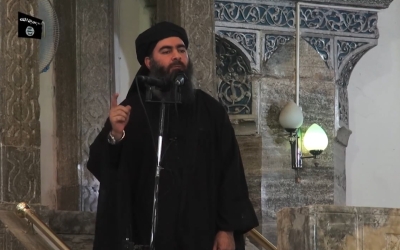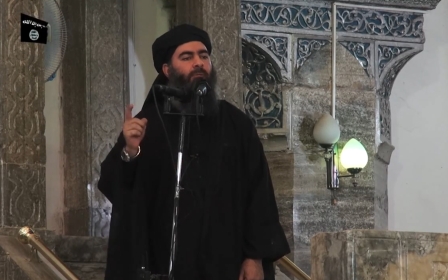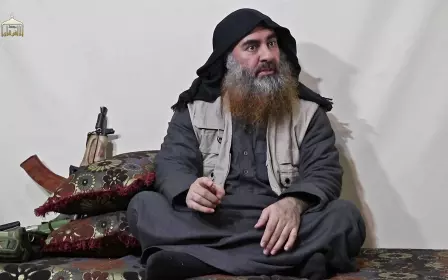Baghdadi killed: How key players are reacting to Islamic State leader's death

The United States and its allies have hailed the killing of Islamic State (IS) group chief Abu Bakr al-Baghdadi in a US raid in Syria's Idlib province, announced by US President Donald Trump on Sunday, as a key victory in the international coalition's five-year war against the militant group which once controlled large areas of Syria and Iraq.
But others, including Russia and Iran, have cast doubt on the significance of the operation.
US: Trump triumphant
In a televised address on Sunday, Trump announced that Baghdadi died “whimpering and crying”, as he detonated a suicide vest while being pursued to a dead-end tunnel beneath the house where he was in hiding near the village of Barisha in northwestern Syria.
US House of Representative Speaker Nancy Pelosi struck a less triumphant tone, however, and warned of the threat still posed by IS. The prominent Democrat also criticised Trump for not notifying the US Congressional leadership prior to the raid.
Stay informed with MEE's newsletters
Sign up to get the latest alerts, insights and analysis, starting with Turkey Unpacked
“The death of al-Baghdadi is significant, but the death of this ISIS (Islamic State) leader does not mean the death of ISIS," she said using another acronym for the group.
"Scores of ISIS fighters remain under uncertain conditions in Syrian prisons, and countless others in the region and around the world remain intent on spreading their influence and committing acts of terror."
Iraq: Baghdad claims credit
In a statement, Iraq’s government took credit for helping the Americans to pinpoint Baghdadi’s hideout in Idlib.
"Subsequently, US forces, in coordination with Iraq’s National Intelligence Service, carried out an operation which led to the elimination of the terrorist al-Baghdadi.
"Iraq’s Armed Forces and intelligence services will continue to work with Iraq’s partners in the @coalition to relentlessly pursue Daesh (Islamic State) terrorists and to defeat their ideology."
Reacting to Baghdadi's death, Iraqi Prime Minister Barham Salih said that the "fight continues to eradicate the scourge of terrorism through continued security vigilance, inclusive political systems [and] development."
Turkey: 'Turning point'
Turkish President Recep Tayyip Erdogan, who was given advanced notice of the raid by the Americans, said that Baghdadi's killing “marked a turning point in our joint fight against terrorism".
Drawing parallels between IS and the outlawed Kurdistan Workers Party (PKK) and its ally the Kurdish YPG, even though the latter was instrumental in the fight against IS, Erdogan said: “I am confident that a decisive struggle against terrorism, in line with the spirit of alliance, will bring peace to all of humanity.”
Erdogan's spokesperson, Ibrahim Kalim told reporters that Baghdadi's death was a "victory" adding that Ankara would continue its fight against IS's "deviant ideology".
Kalin reaffirmed Erdogan's statements and criticised attempts to acknowledge the YPG's role in Baghdadi's assassination.
"We see there is an effort to give credit to the YPG terror group in Syria as if they shared intelligence or supported (the US operation)," Kalin said, adding that this was "an effort to legitimise the YPG terror organisation".
"Efforts to absolve or dignify them are unacceptable for us."
Syrian Democratic Forces: Joint intelligence
For their part, the Kurd-dominated Syrian Democratic Forces (SDF), which had helped to oust IS from Syria, stressed that they had also helped to track down Baghdadi.
Islamic State: From Iraqi insurgency to death of Baghdadi
+ Show - Hide2004-11: Following the 2003 US-led invasion of Iraq, an al-Qaeda offshoot sets up, changing its name in 2006 to the Islamic State in Iraq.
2011: The group's leader, Abu Bakr al-Baghdadi, sends operatives to Syria to set up a subsidiary of the group. Baghdadi follows in 2013, breaking with al-Qaeda and renaming his group the Islamic State in Iraq and the Levant.
2014: Its sudden success begins with the seizure of Fallujah in Iraq and Raqqa in Syria. Mosul and Tikrit follow. Baghdadi renames the group Islamic State and declares a "caliphate". Raqqa and Mosul become IS's two de-facto capitals.
US warplanes strike IS positions in northern Iraq, and Washington forms a coalition of more than 70 countries to fight the group, spearheaded on the ground in Iraq by Iraqi government forces, Iran-backed militia groups and Kurdish peshmerga fighters, and in Syria by the Kurdish-led Syrian Democratic Forces. The offensive halts IS’s momentum.
2015: Militants in Paris attack a satirical newspaper and a kosher supermarket, the bloody start to a global wave of attacks where IS claims responsibility. Fighters in Libya behead Christians and pledge allegiance to IS, followed by groups in other countries, but they stay operationally independent.
2016: The defeat against IS starts to take shape with winning offensives in Fallujah in Iraq and Manbij in Syria.
2017: IS suffers a year of catastrophic defeats, losing Mosul in Iraq, and Raqqa and Deir Ezzor in Syria.
2018: The Syrian government retakes IS enclaves in Yarmouk, south of Damascus, and on the frontier with the Israeli-occupied Golan Heights.
2019: IS fighters are defeated at their last enclave on the Euphrates in the village of Baghouz. The SDF declares the "caliphate" eliminated. In a video, Baghdadi acknowledges defeat in Baghouz while threatening "revenge" attacks.
On 27 October, US President Donald Trump announces the death of Baghdadi in a raid by US special forces soldiers in Idlib in northwestern Syria.
Their collaboration came despite a rift with the Americans whose troop pull-out from northern Syria earlier this month paved the way for a Turkish incursion.
“For five months there has been joint intel cooperation on the ground and accurate monitoring, until we achieved a joint operation to kill Abu Bakr al-Baghdadi.
"Thanks to everybody who participate in this great mission.@realDonaldTrump#SDF#USArmy #Rojava #Baghdadi."
Iran: 'Your creature'
Iran, repeating a claim that the US had created IS, downplayed the significance of the raid.
Information Minister Mohammad Javad Azari-Jahromi, tweeted: "Not a big deal, You just killed your creature", accusing the United States, its longtime foe, of creating IS.
Iranian government spokesman Ali Rabiei alleged that Gulf states had played a part in the steep rise of IS:
"The killing of Baghdadi will not end Daesh [Islamic State] and its ideology... which was created and flourished with the help of regional petrodollars."
Britain: Battle not over
British Prime Minister Boris Johnson, meanwhile, said Baghdadi’s death was “an important moment in our fight against terror”, but cautioned that there was still a long way to go to defeat the group which now has affiliates as far afield as West Africa, Afghanistan and the Philippines.
Johnson said on Twitter: “We will work with our coalition partners to bring an end to the murderous, barbaric activities of Daesh once and for all.”
Foreign Secretary Dominic Raab also said on Twitter: “Following the death of Daesh’s leader, we must not allow Daesh to glorify someone who actioned such inhumane & abhorrent criminal acts. The UK will continue to support efforts to #DefeatDaesh.”
France: 'Hard blow'
President Emmanuel Macron described the news as a “hard blow” against IS but said the “fight continues”.
"Al-Baghdadi's death is a hard blow against Islamic State, but it is just a stage. With our partners in the international coalition, the fight continues to finally defeat this terrorist organisation. It is our priority in the Middle East."
Defence Minister Florence Parly said on Twitter: "Baghdadi: early retirement for a terrorist, but not for his organisation. I congratulate our American allies with this operation. My thoughts today are for all the victims of the madness of Baghdadi and the criminals who have followed him."
France was also a member of the US-led coalition against IS. A number of high-profile IS-inspired attacks have been carried out on its soil.
Russia: Dead again?
Meanwhile, Russia queried whether Baghdadi had even been killed in the operation, citing previous reports of his death.
Major-General Igor Konashenkov, quoted by RIA news agency: "The Russian Ministry of Defence does not have reliable information on the operation by US servicemen... on yet another 'elimination' of former IS leader Abu Bakr al-Baghdadi."
Konstantin Kosachyov, chairman of the upper house of the Russian parliament's foreign affairs committee, was quoted on the Interfax news agency: "Last respects have been paid to al-Baghdadi at least five times in the past. (Also) countering terrorism is a much more difficult task than the physical destruction of its leaders, even the most irreconcilable."
Saudi Arabia: IS 'distorted real image of Islam'
Saudi Arabia commended the US government for killing Baghdadi on Monday, a day after Trump made his announcement, according to local Saudi state media.
A Saudi foreign minister source praised Washington for its efforts in Baghdadi's assassination and said it intended to continue working with its allies, including the United States, to fight terrorism.
"The kingdom appreciates the US administration's efforts to pursue members of this terrorist organisation that distorted the real image of Islam... and committed atrocities and crimes," said a Saudi foreign ministry source, according to the official Saudi Press Agency (SPA).
"Saudi Arabia continues its efforts with its allies, especially the United States, in fighting terrorism," the source added.
Middle East Eye delivers independent and unrivalled coverage and analysis of the Middle East, North Africa and beyond. To learn more about republishing this content and the associated fees, please fill out this form. More about MEE can be found here.





